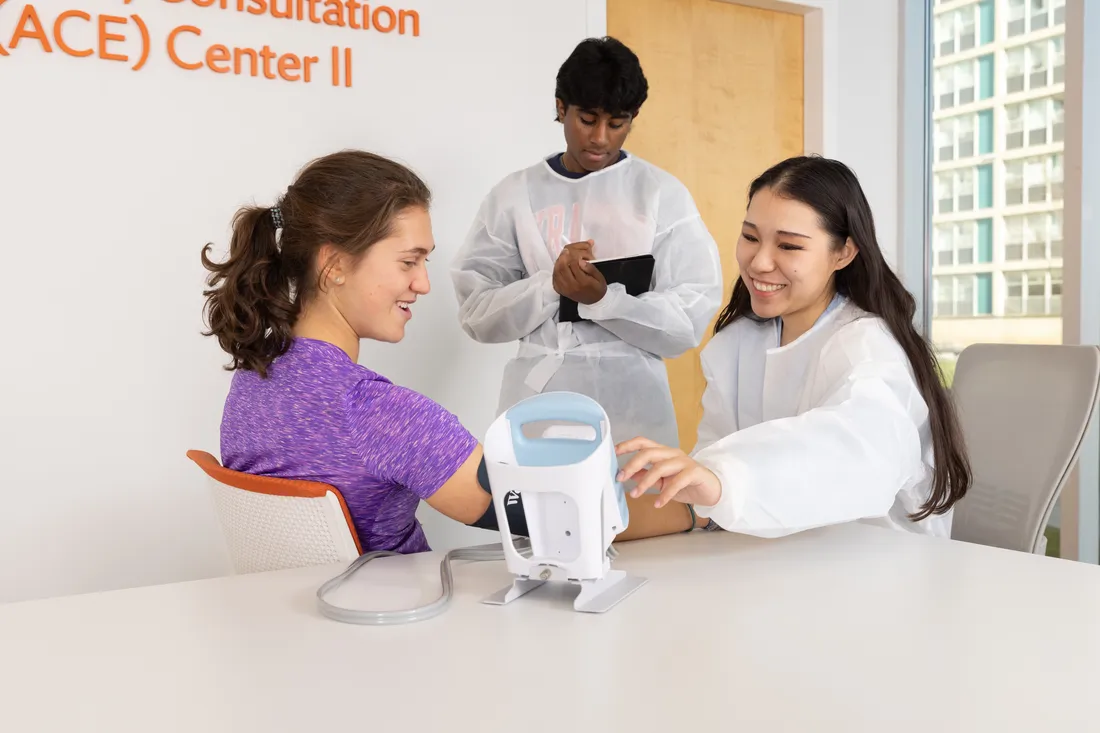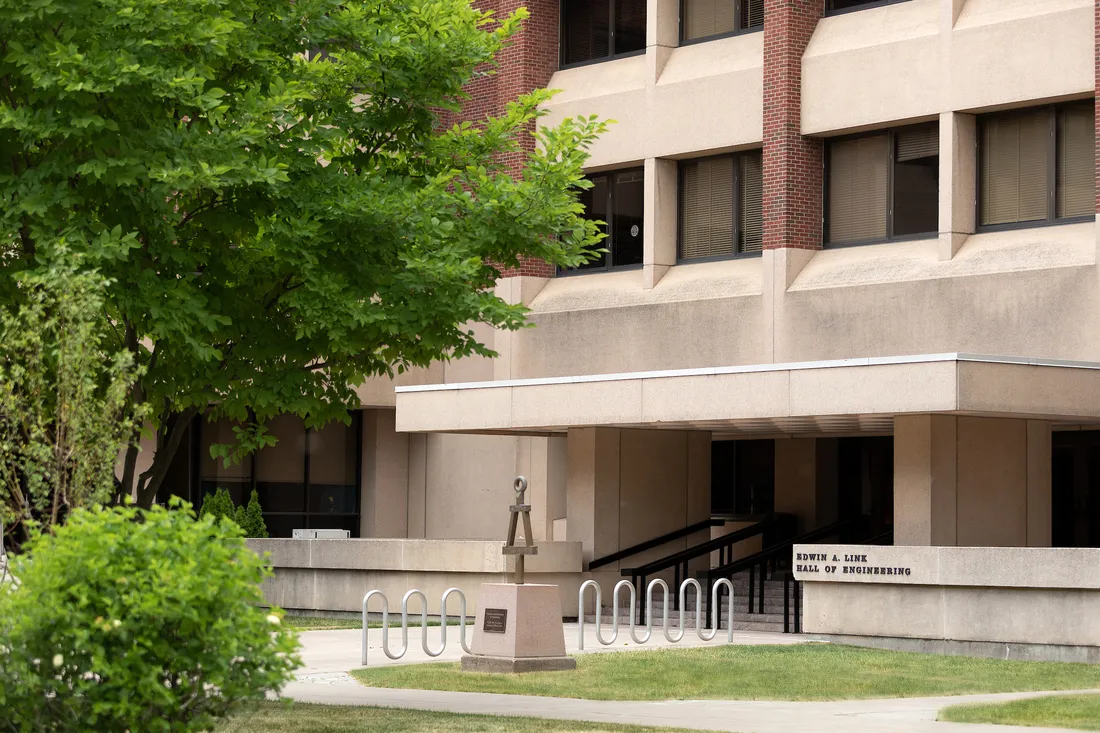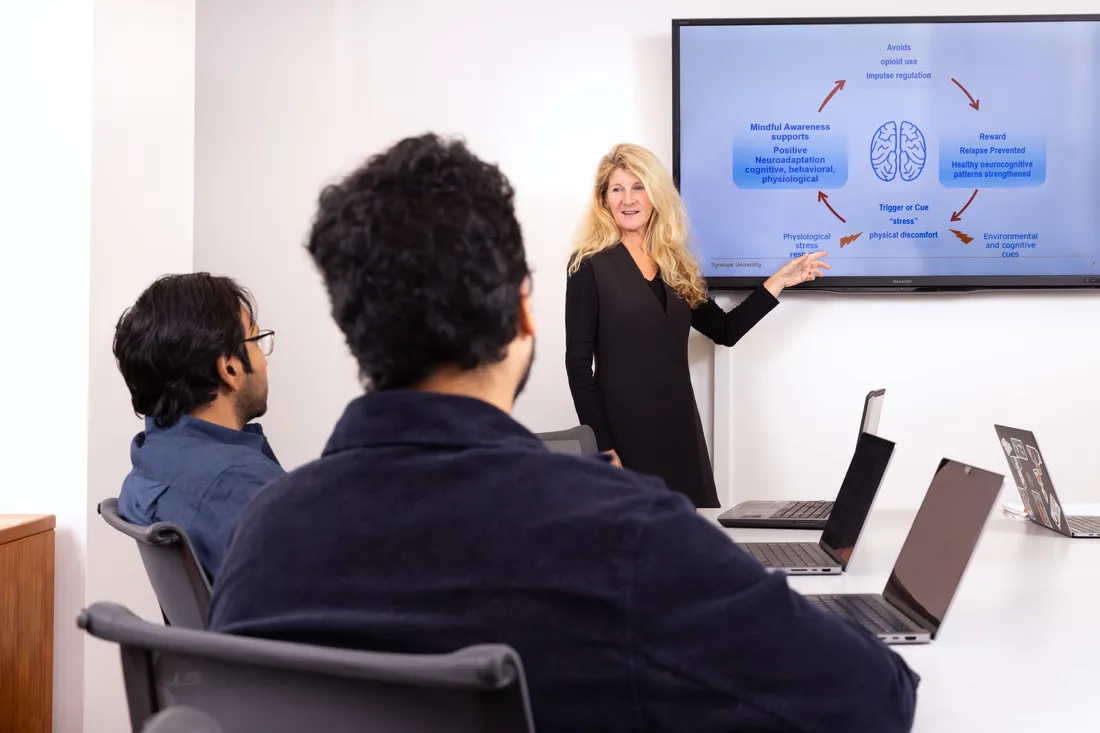
Public health professor Dessa Bergen-Cico ’86, G’88, G’92 discusses the use of mindfulness-based practices as a way to help patients in recovery for opioid use disorder avoid relapse.
As the nation grapples with an ongoing opioid crisis that annually claims tens of thousands of lives, two Syracuse University professors are collaborating on a research project that they hope will help people receiving opioid use disorder treatment to curb their cravings and maintain their recovery. With the support of a four-year grant from the National Science Foundation, lead principal investigator Asif Salekin, an electrical engineering and computer science professor in the College of Engineering and Computer Science, and co-principal investigator Dessa Bergen-Cico ’86, G’88, G’92, a public health professor and coordinator of addiction studies programs in the David B. Falk College of Sport and Human Dynamics, have teamed up with the Crouse Health Addiction Treatment Services in Syracuse where they’re working with outpatients in recovery for opioid use disorder.
The patients—who receive medication for addiction treatment at the clinic—have volunteered to participate in this novel study, which seeks to create an automated, individually tailored intervention that integrates an adaptive artificial intelligence (AI) system with a sensor-equipped smartwatch to monitor changes in their neurophysiology. The goal is for the system to detect escalating stress—a known risk factor for opioid cravings and relapse risk—and prompt the patient to engage in mindfulness-based practices, such as breathing techniques and meditation, to reduce the neurophysiological stress response. “We’re combining what we know from the decades of research I’ve been involved in around mindfulness-based practices with veterans and other challenged populations and applying that to what we know about the neurophysiology of stress and addiction craving to establish more effective and sustainable recovery,” says Bergen-Cico, an expert in addressing substance use, trauma and addictive behaviors.
Monitoring Stress
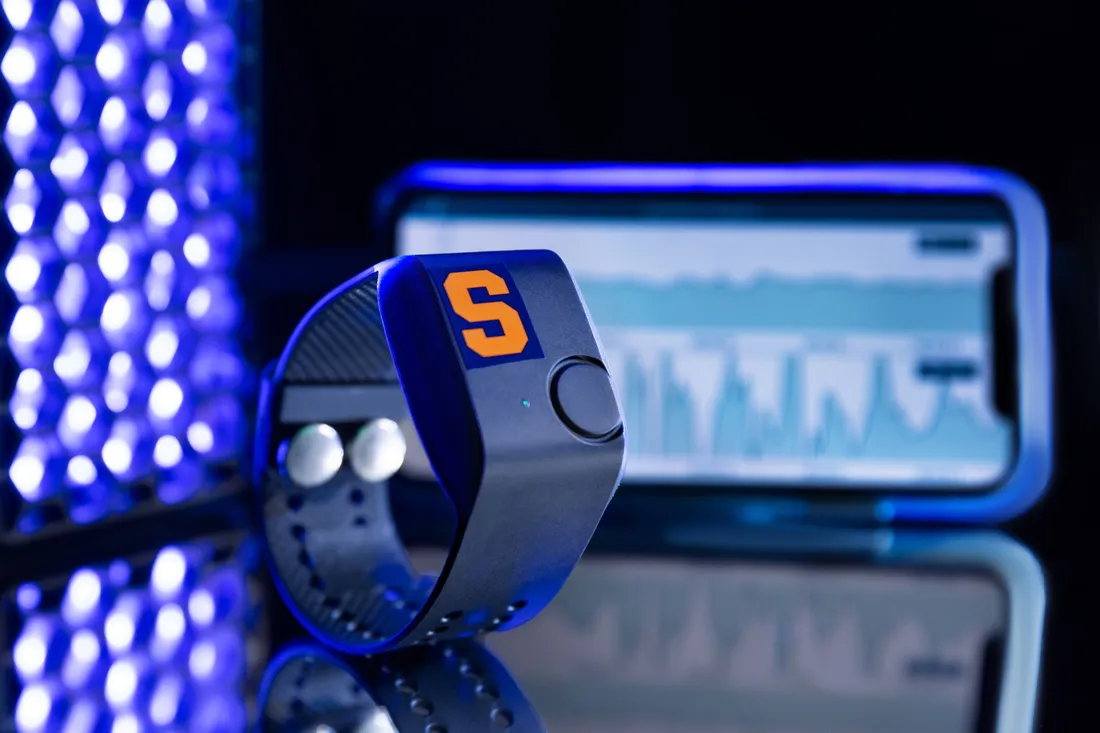
Through the study, the researchers seek to create an automated, individually tailored intervention that integrates an adaptive AI system with a sensor-equipped smartwatch to monitor changes in a patient’s neurophysiology.
Salekin specializes in assessing stress and anxiety using sensing technologies. “Stress is very diverse and a broad umbrella,” he says. “So how to identify the common markers across all the variations and effectively assess that information using passive sensors is an open research challenge that I’m fascinated to address.”
Salekin’s research team—which includes computer science doctoral candidates Harshit Sharma and Yi Xiao—is focused on creating an unbiased AI algorithm that will accurately reflect changes in an individual’s behavior. “We are working with an at-risk population, so we want the AI to be robust and trustworthy,” Salekin says. “We want to know how to avoid putting our patients in an adverse situation and incorporate that in the AI.”
Revealing Results
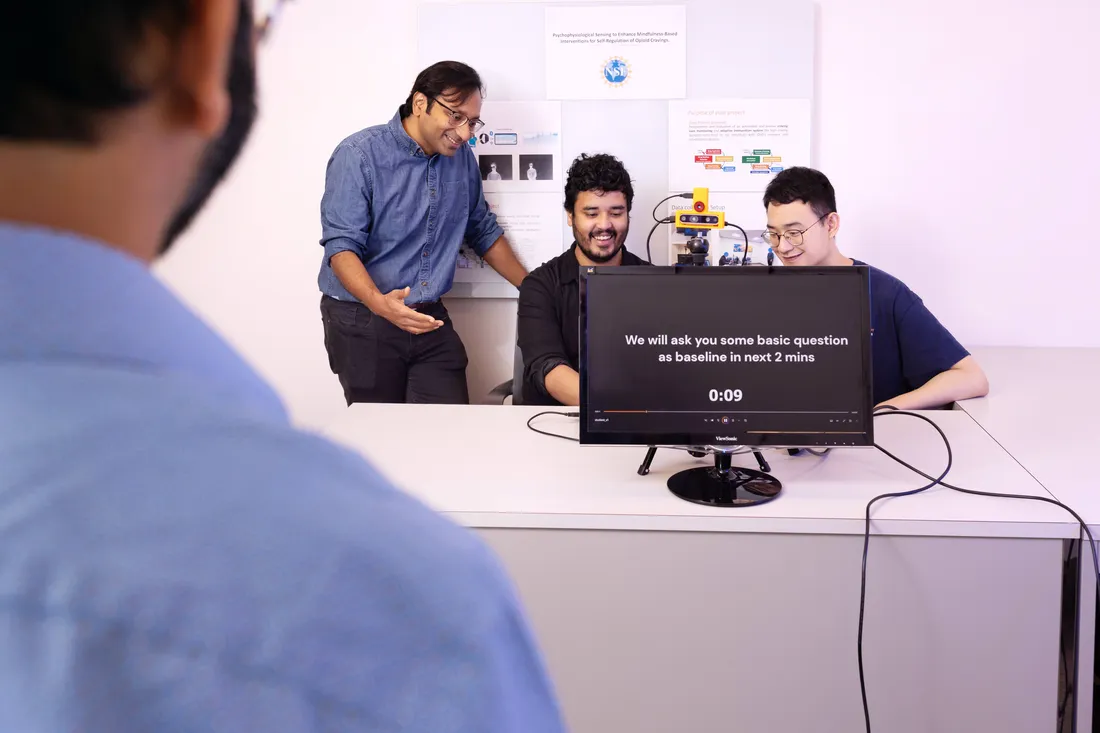
Electrical engineering and computer science professor Asif Salekin (left) and doctoral candidates Harshit Sharma and Yi Xiao demonstrate how they use sensing technologies and a stress test to gather data on an individual’s neurophysiological responses to questions.
In the project’s first phase, they set up a lab at the Crouse Health Addiction Treatment Services, and Sharma and Xiao conducted a Trier Social Stress Test on the patients to gather data on heart rate, heart rate variability, skin conductance, respiration and skin temperature (they also tested a comparison control group of non-opioid or other substance users from the Syracuse area). The test featured an interactive video with both relaxing and stress-inducing imagery and required participants to perform a series of tasks, including doing a timed counting exercise and a numbers game, recalling good and bad memories and creating a song in 30 seconds. The team used thermal and depth cameras as well as a radar-imaging device, which captures body movement and gestures, and a smartwatch with multiple passive sensors to capture the biometric data in real time.
According to Bergen-Cico, the stress test results revealed two important findings: The rate of the physiological stress response was much more rapid for people with an opioid use disorder, and they were unable to verbally recall a positive experience, a characteristic she attributes to reward deficiency syndrome. “That the patients can’t verbalize something positive in their lives is a groundbreaking finding and component of the study,” she says. “They are readily able to recall negative experiences, which produce dramatic physiological stress response, but they are seemingly unable to recall joy or pleasure in anything.”
We’re combining what we know from the decades of research I’ve been involved in around mindfulness-based practices with veterans and other challenged populations and applying that to what we know about the neurophysiology of stress and addiction craving to establish more effective and sustainable recovery.
Dessa Bergen-Cico ’86, G’88, G’92, public health professor
Now in its second phase, the project is moving from the lab to a home environment, where the patients will wear the sensor-equipped smartwatches, providing feedback that will help the researchers evaluate and adapt their algorithm. In the final phase, the researchers plan to pilot their invention, a fully automated AI intervention that brings all their research together where patients will be trained in mindfulness practices and prompted to use these practices when the AI detects neurophysiological stress response. If successful, they hope to apply for a National Institutes of Health grant that would lead to a medical trial.
Unique Interdisciplinary Collaboration
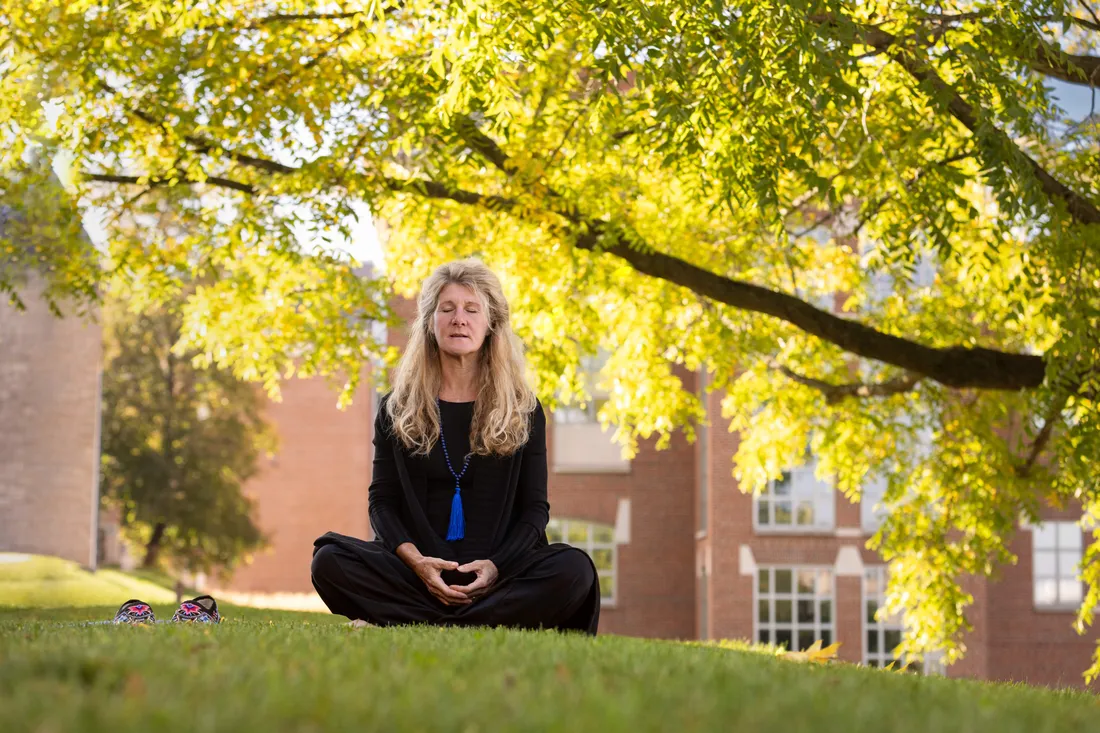
Bergen-Cico is an expert in helping individuals apply mindfulness-based practices to address stress and addiction craving.
Along with the project’s unique interdisciplinary collaboration and putting AI and mindfulness theories into practice, Bergen-Cico cites the importance of building community connections, crediting Monika Taylor G’99, G’17, G’18, director of the Crouse Health Addiction Treatment Services, as a key collaborator and project manager Susan Scholl ’81 for working with the clinic and coordinating recruiting. Both she and Salekin highly value the work of Sharma and Xiao, who communicated with the patients and guided them through the lab tests. Bergen-Cico says addiction studies and public health graduate and undergraduate students have also assisted with the project.
Sharma says it’s heartbreaking to learn about the patients’ lives and struggles but believes the team’s hard work and the technology they’re developing will truly have a positive impact. “It’s been an eye-opening experience understanding how people suffer after opioid use and how they’re trying to recover,” he says. “Being a part of this project and contributing little things to make it better for them makes my day.”

